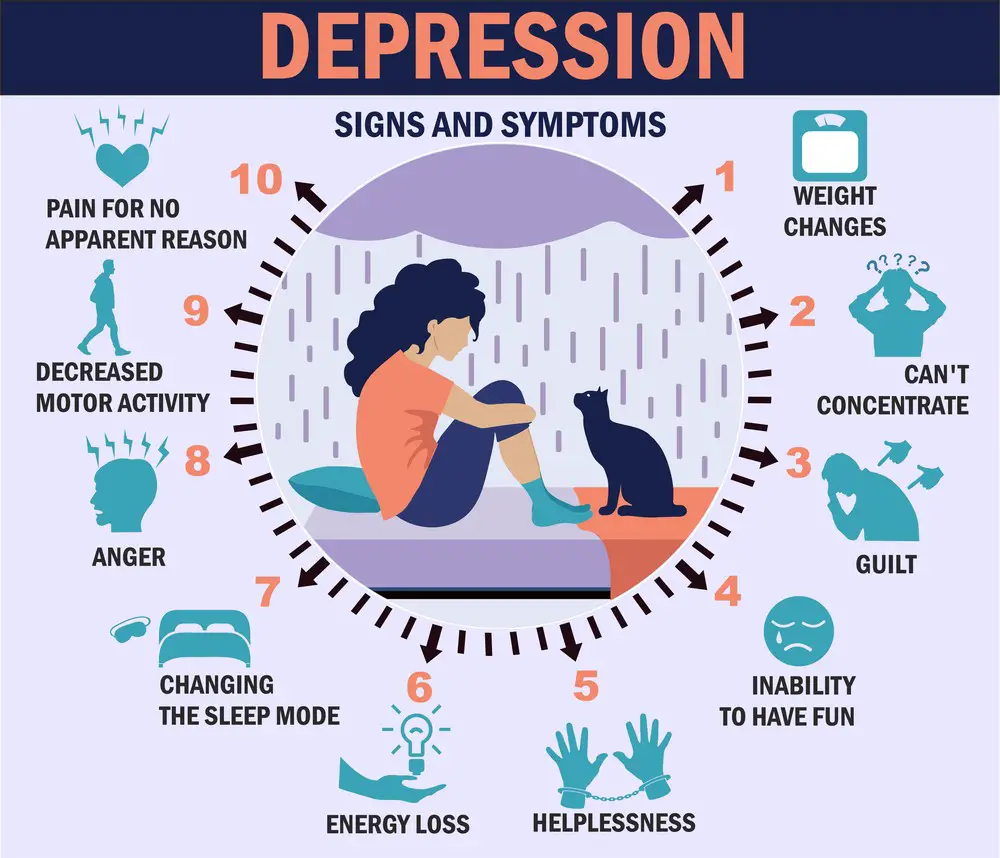As a BetterHelp affiliate, we receive compensation from BetterHelp if you purchase products or services through the links provided
Navigating personal relationships while managing depression can be a labyrinthine challenge. This article distills practical advice, drawing on mental health experts’ wisdom to maintain and strengthen connections even when depression looms. Discover actionable strategies that prioritize communication, boundaries, and intentional vulnerability to support personal well-being and relationship health.
- Treat Depression Like An Unwanted Houseguest
- Prioritize Open And Honest Communication
- Set Small, Clear Boundaries
- Practice Scheduled Vulnerability
- Communicate Openly And Without Shame
- Share A Bandwidth Snapshot Weekly
- Use ‘I’ Statements To Communicate Needs
- View Depression As A Signal For Connection
- Practice Micro-Connecting With Loved Ones
Engage in Shared Low-Energy Activities
Develop a Support System Plan
- Encourage Mutual Self-Care Practices

1. Treat Depression Like An Unwanted Houseguest
Let me start with a confession: depression is the worst houseguest ever. It shows up uninvited, raids your emotional refrigerator and then tries to convince you that you never liked having friends over anyway. But here’s what I’ve learned about keeping relationships healthy when depression crashes the party.
The single most important thing I do is remind myself that depression is a masterful liar. When it whispers “they don’t really care” or “you’re just bringing everyone down,” I’ve learned to respond with: “Nice try, depression, but I don’t side with you anymore.” This might sound silly, but treating depression like an unwanted houseguest rather than accepting its perspective as truth has been game-changing.
Here’s my practical approach: I use what I call the “weather report” system. Just like you’d tell your partner if a storm was coming, I give simple updates about my mental weather: “Heads up—feeling pretty cloudy today” or “Minor emotional thunderstorms expected.” This does two crucial things: it helps them understand what’s happening without drowning them in details, and it separates me from the depression. I’m not “being difficult”—we’re both dealing with some challenging weather together.
To maintain connections, I’ve learned to set up what I call “depression-proof” interactions. These are small, manageable ways to stay connected even on tough days—maybe it’s just sitting in the same room reading or having a 10-minute check-in over coffee. The key is keeping them simple and consistent so depression can’t talk you out of them.
Remember: your loved ones prefer the real you, even when you’re struggling, over the perfect version depression tells you you should be. They don’t need you to be “on” all the time—they just need to know you’re still there, still trying.
And here’s a bit of hope to hold onto: every time you choose to communicate honestly about your struggles instead of withdrawing, you’re not just maintaining your relationships—you’re actually strengthening them. You’re showing others that it’s okay to be human, to struggle sometimes, and to need support.
That’s worth fighting for, even when depression tries to convince you otherwise.
(And yes, depression, I’m definitely talking about you behind your back. Deal with it.)
Remember: you’re not “being depressed”—you’re being human, experiencing depression. There’s a difference, and it matters.
Kathy McMahon, Psy.D., President, Couples Therapy Inc.
2. Prioritize Open And Honest Communication
When it comes to managing the impact of depression on my relationships, one thing I prioritize is open and honest communication. Depression can make it hard to express how I’m feeling or ask for support, but I’ve learned that sharing what’s going on in my mind, whether it’s feeling overwhelmed, drained, or distant, helps those around me understand what I’m going through. I make a point to let my loved ones know that it’s not about them, but that I’m working through something internally.
I also try to set realistic expectations for myself and my relationships. I recognize that I may not always be the best company or emotionally available, so I communicate that upfront. For example, if I’m feeling low and can’t fully engage, I let the other person know that I’m not withdrawing because of something they did, but because I’m in a tough spot. By explaining this, it keeps misunderstandings at bay and reassures them that it’s temporary.
 Another thing I do is make small, consistent efforts to connect, even if it’s just checking in with a text or a brief phone call. I don’t put pressure on myself to be the perfect partner, friend, or family member, but I try to show I care in ways that feel manageable in my current state. It’s all about balance, knowing when to ask for space and when to reach out for support.
Another thing I do is make small, consistent efforts to connect, even if it’s just checking in with a text or a brief phone call. I don’t put pressure on myself to be the perfect partner, friend, or family member, but I try to show I care in ways that feel manageable in my current state. It’s all about balance, knowing when to ask for space and when to reach out for support.
I’ve found that seeking professional help for myself has been beneficial not just for me but for my relationships too. Therapy or counseling helps me understand my depression better and gives me tools to manage it. This, in turn, helps me communicate my needs more effectively and strengthens my relationships over time.
Samantha Odo, Real Estate Sales Representative & Montreal Division Manager, Precondo
3. Set Small, Clear Boundaries
I’ve learned that open, honest communication is key when it comes to handling depression in relationships. I remember a time when I was feeling overwhelmed, and it started affecting my interactions with close friends and family. Instead of pulling away, I decided to be upfront about how I was feeling. I shared that I was struggling and needed space but still valued their support.
 One thing I’ve found helpful is setting small, clear boundaries that allow me to manage my emotions without shutting people out. For instance, I let my partner know when I need quiet time to recharge, but I also make sure to let them know I’m still there, just in a different way.
One thing I’ve found helpful is setting small, clear boundaries that allow me to manage my emotions without shutting people out. For instance, I let my partner know when I need quiet time to recharge, but I also make sure to let them know I’m still there, just in a different way.
The key is not to bottle up your feelings. I make it a point to check in with the people around me about how they’re feeling, too. It’s a two-way street. I’ve noticed that when I communicate my needs, others feel more comfortable doing the same, which strengthens our bond. It’s about balance-finding ways to take care of myself without isolating myself from those I care about.
Takarudana Mapendembe, Founder, Best Calculators
4. Practice Scheduled Vulnerability
You know, running a business where we’re constantly dealing with people’s special moments has taught me a lot about relationships and mental health. One thing I’ve learned to do to address the impact of depression on my relationships is to practice what I call “scheduled vulnerability.”
It might sound a bit odd, but hear me out. When you’re dealing with depression, it’s easy to withdraw and keep everything bottled up inside. But I’ve found that setting aside specific times to open up to my partner or close friends has been a game-changer.
Depression can be like a bad DJ—it tries to drown out all the good tracks in your life. Scheduled vulnerability is like taking back the mic.
Here’s how it works for me: Once a week, my partner and I have a “check-in” session. It’s a safe space where we can both share how we’re feeling, what we’re struggling with, and what we need from each other. It’s not always easy, but it’s become a vital part of maintaining our connection.
During these sessions, I make a point to be honest about my needs. If I’m having a particularly rough week and need some extra alone time, I’ll say so. If I’m feeling disconnected and could use more physical affection, I’ll express that too. It’s all about clear, open communication.
What’s great about this approach is that it gives both of us a chance to be heard and understood. My partner knows that even if I’m withdrawn during the week, there’s a dedicated time where we can reconnect. It takes the pressure off both of us and helps prevent misunderstandings.
 Of course, it’s not always perfect. There are times when I’ve struggled to open up, even during our scheduled sessions. But the very act of showing up and trying has made a huge difference in maintaining our relationship through the ups and downs of depression.
Of course, it’s not always perfect. There are times when I’ve struggled to open up, even during our scheduled sessions. But the very act of showing up and trying has made a huge difference in maintaining our relationship through the ups and downs of depression.
I’ve even started implementing a version of this with my team. We have regular check-ins where everyone can share how they’re doing, both professionally and personally. It’s created a more supportive, understanding work environment, which is crucial when you’re in a business that’s all about creating joyful experiences for others.
Remember, depression doesn’t have to be a solo gig. With the right communication strategies, you can keep your relationships in harmony, even when you’re not feeling your best.
Sally Johnson, Owner, Green Light Booking, LLC
5. Communicate Openly And Without Shame
 One thing I often encourage, and have seen work for many of our patients, is learning to communicate openly and without shame about how depression impacts you. It can be as simple as saying, “I’m feeling low today, and it might make me quieter than usual, but it’s not about you.” That kind of transparency helps to keep loved ones from misunderstanding your behavior and builds trust.
One thing I often encourage, and have seen work for many of our patients, is learning to communicate openly and without shame about how depression impacts you. It can be as simple as saying, “I’m feeling low today, and it might make me quieter than usual, but it’s not about you.” That kind of transparency helps to keep loved ones from misunderstanding your behavior and builds trust.
For healthy connections, setting boundaries is key too. I’ve seen patients thrive when they explain their limits gently, like, “I need some time alone to recharge, but I value our time together.” It’s about balancing your needs while keeping the door open for connection. Ultimately, relationships can be a huge source of support when we approach them with honesty and self-compassion.
Anand Mehta, Executive Director, AMFM Healthcare
6. Share A Bandwidth Snapshot Weekly
While much of my work revolves around technology and education, I’m also vocal about mental health, particularly how it affects personal and professional relationships.
 One unconventional thing I do to address the impact of depression on my relationships is something I call a “Bandwidth Snapshot.” Essentially, every week I share a quick, color-coded status of my emotional capacity with my closest friends, family, or colleagues. It’s like giving them a heads-up that I’m running on “red” (high stress, minimal emotional energy) or “yellow” (medium stress, some emotional energy). This snapshot sets the expectation for how much I can give, whether that’s listening to a friend’s issue or being fully present in a meeting. What’s interesting is that instead of shutting people out, it actually invites them to problem-solve with me or let me be off the hook when I need space.
One unconventional thing I do to address the impact of depression on my relationships is something I call a “Bandwidth Snapshot.” Essentially, every week I share a quick, color-coded status of my emotional capacity with my closest friends, family, or colleagues. It’s like giving them a heads-up that I’m running on “red” (high stress, minimal emotional energy) or “yellow” (medium stress, some emotional energy). This snapshot sets the expectation for how much I can give, whether that’s listening to a friend’s issue or being fully present in a meeting. What’s interesting is that instead of shutting people out, it actually invites them to problem-solve with me or let me be off the hook when I need space.
Communicating needs becomes more straightforward when people know your baseline. There’s less guilt and fewer misunderstandings, like someone feeling you’re being distant on purpose. Meanwhile, it also encourages them to share their own “bandwidth,” so it’s a reciprocal system. By normalizing these quick emotional check-ins, we keep our relationships healthy and transparent despite any challenges my depression may cause. It’s been a game-changer for me, and it might be a fresh angle for your story on maintaining healthy connections while navigating mental health.
Derek Pankaew, CEO & Founder, Listening.com
7. Use ‘I’ Statements To Communicate Needs
When addressing the impact of depression on my relationships, I focus on fostering open and honest communication. One key step I take is to recognize and acknowledge my feelings rather than suppressing or denying them. I share my experiences with trusted loved ones, explaining how depression affects me and emphasizing that it’s not a reflection of them or our relationship.
To communicate my needs, I use “I” statements, such as “I’m feeling overwhelmed today and need some quiet time” or “I’d appreciate your support by just listening.” This approach ensures that my loved ones understand what I’m going through without feeling blamed or pressured to “fix” the situation.
 Additionally, I make an effort to stay connected, even in small ways, during difficult periods. Whether it’s sending a quick text or planning a low-pressure activity like a walk, these gestures help maintain connection without overwhelming me.
Additionally, I make an effort to stay connected, even in small ways, during difficult periods. Whether it’s sending a quick text or planning a low-pressure activity like a walk, these gestures help maintain connection without overwhelming me.
By being honest and compassionate with myself and others, I create space for mutual understanding. This not only helps my loved ones feel included but also strengthens our bond, reminding me that I’m not alone in navigating the challenges of depression.
Maddie Hundley, M.S. MMFT, LMFT, Healing Collective Therapy Group
8. View Depression As A Signal For Connection
Addressing the impact of depression on relationships isn’t black and white, as much depression goes undiagnosed. However, whether diagnosed or not, depression can be an opportunity—a chance to seek and share empathy and support, which ultimately strengthens relationships.
 View depression as a signal for connection. For the person experiencing it, this means finding the courage to communicate their needs openly and ask for care (or to be left alone, if that’s their preference), even if it feels difficult. For their partner, it’s about stepping up to provide that support, listening without judgment, and being present. In this process, the supporter must be open to their partner’s style of coping, even if it’s different from their own. This exchange fosters mutual trust and resilience in the relationship.
View depression as a signal for connection. For the person experiencing it, this means finding the courage to communicate their needs openly and ask for care (or to be left alone, if that’s their preference), even if it feels difficult. For their partner, it’s about stepping up to provide that support, listening without judgment, and being present. In this process, the supporter must be open to their partner’s style of coping, even if it’s different from their own. This exchange fosters mutual trust and resilience in the relationship.
Professional counselors can be very helpful in guiding this process. They provide tools to communicate effectively, manage emotions, and navigate the complexities of depression together, helping both partners grow closer despite the challenges.
Adam Goulston, Director, MacroLingo
9. Practice Micro-Connecting With Loved Ones
One good approach is “micro-connecting,” or breaking up relationship maintenance into smaller, more manageable moments. Rather than feeling forced to have lengthy conversations, sending a quick text saying, “Thinking of you,” or sharing a meaningful memory can help keep those bonds alive while respecting your current emotional capacity.
Those small touchpoints have helped many people preserve their relationships during difficult periods without feeling overwhelmed. This typically actually strengthens the relationship instead of straining it by clear and honest communication about how you feel about depression.
By this, managing depression doesn’t have to equal losing the connection that actually matters to you. Actually, this can be the opposite—by staying more open in communication, working out ways to keep in contact even, and also setting very sensible boundaries. Remember how your actual connections often mean you are really more focused upon them, rather than constantly needing contact.
Dr. Britt Lindon, Ph.D. Clinical Psychologist, Sens Psychology
10. Engage in Shared Low-Energy Activities
Participating in simple, low-energy activities with loved ones, such as watching a movie or walking quietly, can foster connection without draining energy. These shared moments provide comfort and companionship.
11. Develop a Support System Plan
Creating a proactive support system plan can alleviate pressure during depressive episodes. Identify trusted individuals you can reach out to and establish preferred ways they can offer help, whether through listening, distraction, or practical support.

12. Encourage Mutual Self-Care Practices
Incorporating mutual self-care routines with loved ones can benefit both parties. Activities like guided meditation, stretching, or cooking a healthy meal together create opportunities for connection while promoting well-being.
By incorporating these strategies, individuals experiencing depression can foster stronger, more resilient relationships. Open communication, intentional vulnerability, and small, consistent efforts make it possible to maintain meaningful connections even in challenging times.
- 3 Ways Wearing a Hat Can Help Lower Your Stress Levels - April 19, 2025
- Breaking the Silence: Why Men’s Mental Health Matters More Than Ever - April 15, 2025
- How to Transform a Home’s Patio Space into a Relaxing Space - March 23, 2025
This site contains affiliate links to products. We will receive a commission for purchases made through these links.



